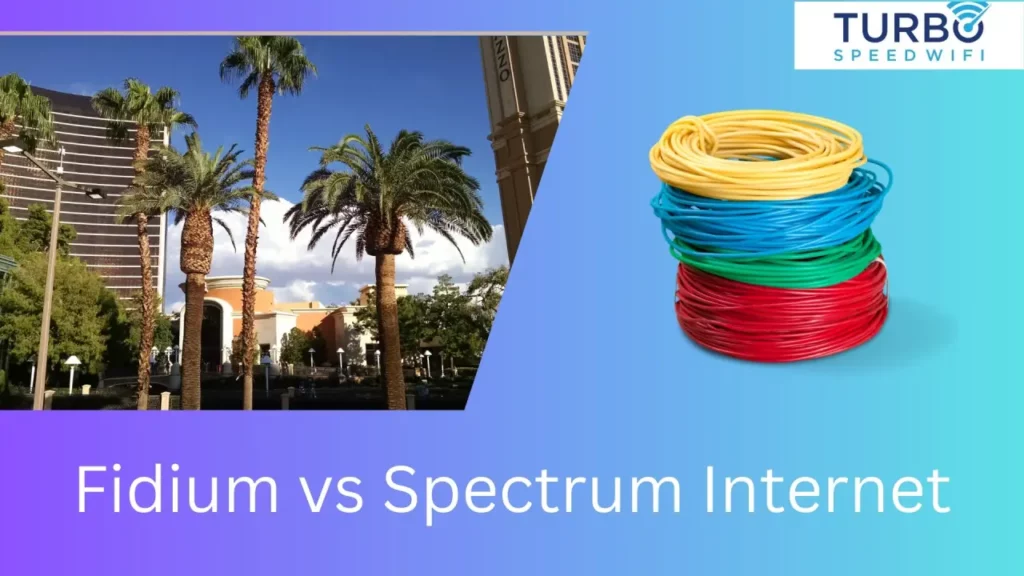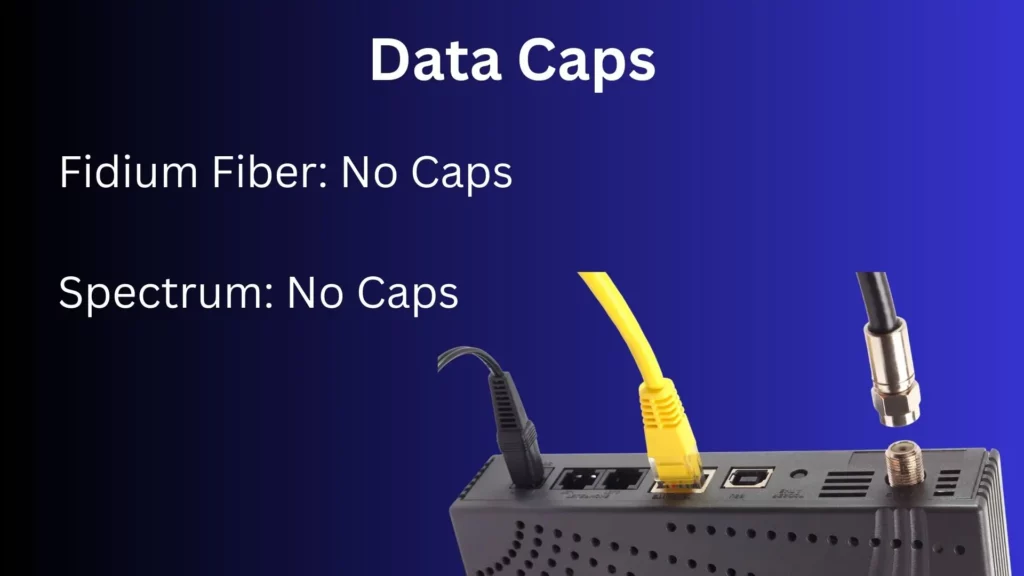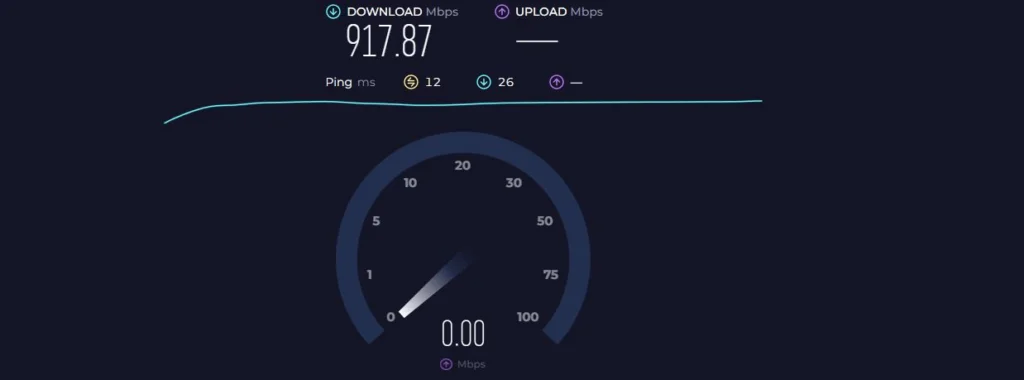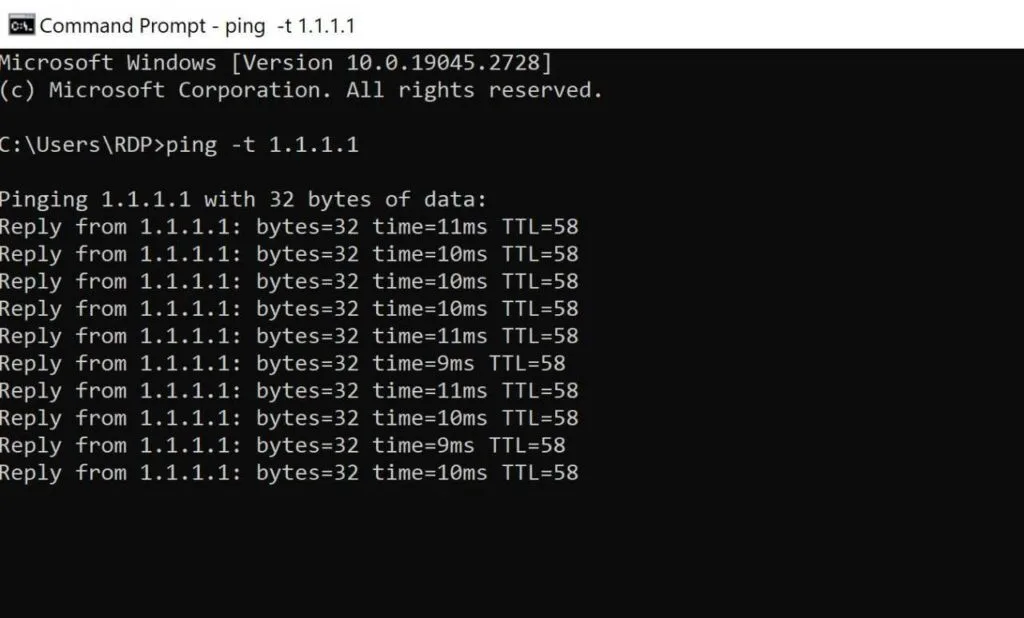Are you annoyed with your current home internet service provider and looking to make a change, or perhaps moving to a new location? Fidium and Spectrum are two popular internet service providers that you may be considering.
Both providers offer fast download speeds, low latency, good reliability, and competitive prices. They also do not charge equipment rental fees to their customers or impose data caps on any of their plans.
I have used both Fidium Fiber and Spectrum Internet and wanted to provide my honest feedback for anyone considering subscribing to Fidium or Spectrum for residential internet service.
I will also show you three techniques that can lower your internet bill by 30% or more and works with virtually any internet service provider. It can also help to reduce those pesky fees that are oftentimes hard to understand.

Table of Contents
Fidium vs Spectrum Internet: A Brief Introduction
As an Information Technology professional, I have had the privilege of working on several extremely fast enterprise-class networks with download speeds of 10 Gbps or even higher. I have also needed to provide remote assistance to residents with internet speeds of 1 Mbps or less. I know firsthand the importance of having a solid connection to the internet.
As a New Hampshire native and an avid tech enthusiast, in 2021, I started out on a mission to help people find better internet solutions for their homes. Fidium and Spectrum are two popular internet service providers (ISPs) that many people are considering.
I was fortunate to get the opportunity to use both Fidium and Spectrum internet services and compare them head-to-head under real-world conditions. After several months of testing both internet services, measuring dozens of metrics, and troubleshooting issues, I am here to share my findings and help you make a better decision. Fidium or Spectrum, which internet connection is better for most people?
| Fidium | Spectrum | |
|---|---|---|
| Type of Technology | Fiber to the home (FTTH) | Fiber / DOCSIS 3.1 (Cable) |
| Release Date | 2008 as FairPoint 2021 as Fidium | 1993 as Charter 2014 as Spectrum |
| Download Speeds | 50 – 2000 Mbps | 300 – 1000 Mbps |
| Upload Speeds | 50 – 2000 Mbps | 10 – 35 Mbps |
| Latency (Ping) | 5 ms – 25 ms | 25 ms – 30 ms |
| Ping Stability | Excellent | Very Good |
| Monthly Service Cost | $35 – $95 | $49 – $89 |
| Contracts | No | No |
| Money Back Guarantee | 30 Days | 30 Days |
| Data Caps | No | No |
Key Takeaways You Should Know: Based on My Own Experience
- Fidium’s lowest-priced plan has faster upload speeds than Spectrum’s most expensive plan.
- Fidium Fiber upload speeds are faster than any other residential ISP I have tested.
- Pricing is pretty comparable based on download speeds.
- Fidium plans and Spectrum plans all include unlimited data at no additional cost.
- Fidium requires you to use their equipment but includes it in the service cost.
- Spectrum allows you to use your own modem and router if you choose.
- If you wish to use their modem, Spectrum includes it with all plans.
- Spectrum and Fidium both over-deliver on speeds based on my testing in the New England area.
- Spectrum rarely changes your IP address, whereas Fidium changes it frequently.
- Installation fees will vary depending on what is required to establish service to your home.
Fidium vs Spectrum: Price Comparison
Pricing with Fidium and Spectrum are pretty similar when your compare internet plans with similar download speeds. Both Fidium and Spectrum include unlimited data and unthrottled data with all plans. This is a welcome change when compared to the 1.2 TB data cap imposed by Xfinity on most of its plans. The absence of data caps makes both services ideal for people who do a lot of streaming.

Package pricing
Pricing with Fidium is what you would expect. During the promotional period of 12 months, the pricing is excellent. Pricing ranges from about $35 per month up to $70 per month during the promotional period.
After the promo rate expires, you can expect to see a substantial increase in monthly costs. The pricing currently ranges from $55 – $95 per month after the promotions run out.
Fiddium pricing is about average for the industry. They are more expensive than some other providers, but far from being the most expensive. They also offer fantastic upload speed with all plans. There are not many ISPs that will offer you 50 Mbps upload speeds for $55 per month ($35 per month during the promo period).
Pricing with Spectrum is largely dependent on what promotional offer they are offering at the time you sign up for service. Generally, you can sign up for their lowest tier for less than $50 per month. This internet plan includes 300 Mbps download speed and 10 Mbps upload speed.
When it comes to upload speeds, Fidium is clearly the better value. They offer 50 Mbps even with their lowest tier plan, whereas Spectrum maxes out at 35 Mbps on their most expensive plan.
This is not uncommon, as Fidium is a fiber internet service, whereas Spectrum is a DOCSIS 3.1 (Cable) based internet service. In the next few years, DOCSIS 4 technology will enable Spectrum to deliver download speeds of 10 Gbps and upload speeds of over 1 Gbps over existing infrastructure.
Spectrum is also better for pricing if you want to bundle your cell phone with your internet service. Spectrum Mobile is a rapidly growing MVNO that offers competitive pricing and reliable service.
Spectrum Internet is also ideal for anyone who wishes to bundle TV with their internet. Based on my experience, bundle pricing with Spectrum is generally going to save you money when compared to purchasing TV from Spectrum and Internet from Fidium.
Overall pricing is structured very similarly, and depending on what promotions are being offered, Fidium vs Spectrum pricing could be slightly higher or slightly lower. Overall they are pretty similar in terms of pricing.
| Fidium Fiber Internet | Spectrum Internet | |
| Service Cost Per Month | $35 – $95 | $25 – $120 |
| Equipment Rental Cost per Month | Included | $15 (or use your own modem) |
Equipment Rental and Other Fees
Fidium and Spectrum both include the modem rental in the cost of your monthly service. Spectrum charges $5 per month if you want their built-in WiFi solution, whereas Fidium comes with a WiFi gateway included. They do both, however, charge extra for taxes and service fees. This is pretty common in the industry but something to be aware of.
Installation fees will vary but oftentimes range from about $50 up to about $200. However, installation costs could be higher depending on what is required to bring service to your home.
Fees typically add between $5 – $15 per month to the cost of your internet service with most providers. The fees are pretty standard between providers, as many of them are government-imposed fees and taxes.
Fidium Fiber vs Comcast (Xfinity) Download and Upload Speeds
Fidium offers internet service plans that range from 50 Mbps to 2,000 Mbps. As with most fiber internet services, speeds with Fidium Fiber are 100% symmetrical. If you subscribe to, for example, the 50 Mbps plan, you will get 50 Mbps download speed and 50 Mbps upload speed.
Based on my own testing, Fidium Fiber reliably delivered between 105% and 110% of advertised speeds in both directions. For example, with the 50 Mbps plan, I routinely saw speeds of about 53 Mbps download and upload. With the 250 Mbps plan, I routinely saw speeds of about 265 Mbps. Anytime an ISP over-delivers on their advertised download and upload speeds, that is a welcome sight.
On higher-level plans, I routinely saw speeds that were maxing out the limitations of my testing equipment. With the 1 Gbps Fidium plan, I was consistently getting 948 Mbps download and upload speeds.
This is as high as a standard 1 Gbps ethernet port will allow. Due to packet overhead, you will not get a full 1000 Mbps out of a gigabit ethernet connection. I am sure with the right equipment, I would have seen even higher speeds.
I did not test the Fidium Fiber 2 Gbps plan since I did not have a way to test speeds reliably over 1 Gbps.

Spectrum also performed well in my testing, over-delivering on their advertised speeds in both directions. On average, I was getting between 5% – 10% faster download and upload speeds than advertised. On the 300 Mbps package, I was almost always getting download speeds of 315 Mbps or higher.
As with most DOCSIS cable internet services, upload speeds with Spectrum are much lower than download speeds. Most cable-based internet connections are asymmetrical by design. This is not unique to Spectrum but also impacts other cable internet providers, including Xfinity (Comcast) and Breezeline.
However, I was pleased to find that Spectrum reliably delivers over 100% of advertised upload speeds. Depending on the plan, though, you may be looking at upload speeds as low as 10 Mbps. Their most expensive gigabit plan also maxes out at 35 Mbps. This is the same as what Comcast offers with its gigabit service.
| Fidium FIber | Comcast (Xfinity) | |
| Advertised Download Speed | 50 Mbps – 2,000 Mbps | 300 Mbps – 1,000 Mbps |
| Advertised Upload Speed | 50 Mbps – 2,000 Mbps | 10 Mbps – 35 Mbps |
| Tested Download Speeds (Percent of Advertised) | 105% | 104% |
| Tested Upload Speeds (Percent of Advertised) | 108% | 102% |
Fidium Fiber vs Spectrum Internet: Latency and Stability
Fidium offers great connection stability and low latency. Based on my testing, pings to 1.1.1.1 and 8.8.8.8 were generally in the 10 ms – 12 ms range. They were also extremely consistent and free of connection drops or latency spikes.

Generally, fiber internet offers the most stable connection possible. Based on my experience testing Fidium Internet, I can say that they do a good job of managing their network and ensuring that everything is stable.
Spectrum also proved to be a very stable internet service that performed well in my testing. Latency was not as low as with Fidium but was far from bad. Pings to 1.1.1.1 and 8.8.8.8 were generally in the 35 ms range.
This is higher than with Fidium Fiber but not bad by any standard. Starlink internet and 5G home internet services from T-Mobile and Verizon tend to have much higher latency than Spectrum. I was extremely disappointed when I tested 5G home internet services, ping was often 70 ms or higher, and stability was poor.
Both Fidium Fiber and Spectrum Internet are very stable based on my testing at multiple service addresses in the New England region.
Fidium offers lower latency than Spectrum. This is helped by the nature of being 100% fiber optic vs Spectrum, which is coax/fiber hybrid. Spectrum also appeared to sometime choose to route traffic over a less direct path resulting in higher latency. This is likely due to differences in peering agreements between the providers.
Either way, latency, and stability are very good with both Fidium and Spectrum. Both are suitable for online gaming and other latency-sensitive applications, including Zoom, Microsoft Teams, and other VoIP services.
Equally impressive is the fact that connection stability is good even during peak hours when internet traffic tends to be the heaviest.
| Fidium Internet | Spectrum Internet | |
| Average Latency (Off Peak Hours) | 7 ms – 15 ms | 31 ms – 35 ms |
| Average Latency (Peak Hours) | 7 ms – 18 ms | 32 ms – 35 ms |
| Latency (Max Spikes) (Off Peak Hours) | 20 ms – 30 ms | 40 ms – 53 ms |
| Latency (Max Spikes) (Peak Hours) | 20 ms – 35 ms | 45 ms – 66 ms |
Reliability of Service
I was pleased to find that both services were generally reliable overall, and when there were outages, they got resolved in a timely manner. I wasn’t sure what to expect from Fidium for reliability. Fidium Fiber is the new branding of Consolidated Communication’s residential fiber internet service.
I had previously used Consolidated Communications several years ago when it was Fairpoint Communications. This was a DSL internet service, and reliability was poor, to say the least.
Fortunately, Fidium was much more reliable based on my testing. I did not experience an excessive amount of service interruptions with Fidium Fiber. When compared to Spectrum, I did notice a little more downtime with Fidium, but it was not that bad overall.
In 6 months of testing, based on the reports I ran from Net Uptime Monitor, a leading uptime tracking tool, Fidium was 99.4% reliable. This amounts to an average of 52 hours per year of downtime.
With Spectrum, Net Uptime Monitor showed an average reliability of 99.6%. This amounts to about 34 hours per year of downtime.
Of course, weather and other factors can also affect reliability, and as with most residential internet services, neither ISP offers a service level agreement (SLA) on their residential plans. This means that service is provided on a “best effort” basis with no reliability guarantee.
Based on my testing using Uptime Monitor, most home users would be fine with either service. However, if you work from home, run a business from home, or need the highest level of reliability, both services had some downtime In my testing.
My recommendation to anyone who needs absolute internet connection reliability would be to get 2 separate internet connections from 2 separate service providers.
That is right, you can actually have more than one ISP in the same home. In this case, you could combine Fidium Fiber and Spectrum Internet using a dual WAN router. You can buy dual WAN routers for as little as $50 from brands such as Ubiquiti and Mikrotik.
Based on my personal experience working with enterprise organizations that demanded the highest level of uptime, using two redundant internet connections from separate service providers generally allows you to reach 99.95% reliability in most cases, assuming a battery backup or generator backup is used to continue supplying electricity to your modem and router in the event of a power outage.
For most home users, this will not be necessary, but it is something to be aware of if you depend on your internet connection for critical applications such as running a business from home.
Customer Service / Technical Support Experience
Let’s face it, nobody wants to contact their ISP for support. There is a reason that the internet is full of memes about Spectrum, Comcast, and other ISPs dropping the ball on customer support.
Customer service and technical support are common criticisms of virtually every internet service provider. Fidium is no exception to the rule. They are, after all, part of Consolidated Communications.
Somewhat surprisingly to me, most of the support experiences I encountered with Fidium were okay. They were able to resolve most issues over the phone, and the wait time on hold was shorter than with Spectrum and other service providers, including Verizon, AT&T, and Comcast.
Spectrum support took significantly longer to get on the phone. On average, I was waiting over 30 minutes to get through, especially for tech support-related issues. I was able to get through to Spectrum’s billing department more easily when required.
Generally, the wait times for technical support are the longest during the evening hours. If you are able to call off hours, you will generally get through to a support agent much faster. A lengthy wait for technical support is not uncommon in the residential ISP space.
Overall I would say that the support I received from Fidium was better than that from Spectrum. However, Spectrum support was generally acceptable, and with the exception of long hold times, it generally was an okay experience.
Installation of Service
Both Spectrum and Fidium Fiber are both professionally installed services. A service tech will need to come to your residence to do the installation.
The installation of both services can take 1 – 3 hours, depending on what is needed. Oftentimes Spectrum installation is faster if existing coaxial cabling can be utilized.
Fidium requires running fiber optic cables to the ONT and ethernet cables to your router. This can increase the length of the installation appointment in some cases. However, generally, both services are fast and easy to get installed.
One word of caution with Spectrum is to make sure that if they choose to use your existing cable wiring, everything is in good condition. Cable modems are much more demanding than cable TV and older coaxial cabling may not be up to the job.
Who is Fidium Fiber Best For
Fidium Fiber is best for people who are looking for an affordable internet option that offers solid performance and reliability. Most people who can get Fidium Fiber at their residence should strongly consider it.
Fiber-based internet has several key advantages, including increased reliability, faster upload speeds, and lower latency. Fidium performs similarly to Verizon Fios, AT&T Fiber, and other popular fiber-to-the-home internet services.
The value for the money with Fidium is good overall. This is especially true for cord-cutters and cord-nevers. Getting the best price with Spectrum and most other cable ISPs requires bundling TV with your internet. For people looking for an internet-only solution, Fidium is a good value. Even their least expensive plan has a fast enough internet speed for most people.
Who is Spectrum Internet Best For
Spectrum Internet is ideal for people who would subscribe to cable TV service anyways. For people who choose to have traditional cable TV, the bundle pricing offered by Spectrum is much less expensive than getting internet separate from your cable TV service with a different provider.
Much like Xfinity, Spectrum also offers discounts for people who switch to the Spectrum Mobile platform. Based on the bundle pricing, switching to Spectrum Mobile can save you a decent amount of money over traditional legacy cell phone service providers, including Verizon, AT&T, and T-Mobile.
Availability is another benefit to Spectrum over Fidium. Spectrum has far more coverage regions. You are much more likely to have Spectrum available at your service address than you are Fidium.
Alternatives to Fidium and Spectrum Internet to Consider
The are many alternatives to Fidium and Spectrum that are work checking out. Depending on where you live, you will likely have one or more of these alternatives available to you. Of course, this is not a guarantee, some places only have access to a very small number of internet providers, perhaps as few as one or two.
- Verizon Fios
- Starlink Internet
- T-Mobile Home Internet
- Verizon 5G Home Internet
- AT&T Fiber Internet
- Xfinity Internet
- Breezeline Internet
These are all viable alternatives to Fidium and Spectrum. They all have pros and cons that you should be aware of.
For most people, I would recommend looking for a fiber internet service such as Fidium, AT&T Fiber, or Verizon Fios as their best option. If a fiber-based service is not available in your service area, then a DOCSIS 3.1 cable-based service such as Spectrum, Xfinity, or Breezeline is generally the next best thing to fiber.
DOCSIS 3.1 offers similar download speeds to fiber and upload speeds that are fast enough for most people. With DOCSIS 4.0 on the horizon, cable-based internet download speeds are expected to reach 10 Gbps or higher and upload speeds 1 Gbps or higher. This will close some of the gaps between cable and fiber internet services.
Finally, if you can’t get fiber or cable-based internet at your service address due to your location, look into options such as Starlink Satellite Internet or 5g home internet from Verizon or T-Mobile. These services are generally inferior to cable or fiber internet, but they may be all that you can get in some locations. They also come with all taxes and fees included in the price. One thing to remember is that latency tends to be higher with 5G home internet.
How to Save Big Money on Your Internet Bill
It is no secret that internet prices in the United States and many other countries have increased drastically in the last few years. Getting the best price on your internet service requires shopping around, threatening to cancel, and in some cases, even switching service providers. This is unfortunate, but it really is the reality of the situation.
A trick that has worked well for me, and for many other people, is to frequently call, at least yearly, and ask for any current promotions. Just by calling, you can generally get some kind of promotional discount. Also, don’t think you must be a new subscriber to qualify. Existing customers can oftentimes get discounted pricing as well.
If you have not tried this, I would highly recommend giving this method a try.
If you do not get anywhere, threaten to cancel and ask for the customer retention department. They oftentimes have more flexibility in offering larger discounts. Give this a try, and you can likely cut your monthly bill by 30% or more.
Finally, if that doesn’t help, consider switching to a different internet service provider. When you sign up with your new provider, you can get whatever promotional pricing they offer. See if you can lock in that price for at least 12 months, or preferably 24 months.
Keep in mind that you may have to pay an installation fee to get your new service connected. Not all ISPs charge an installation fee, but may do.
After 24 months or so, you will have the option to rinse and repeat. By that time, your previous ISP will probably be offering you a discount to switch back.
Conclusion: Fidium or Spectrum Internet: Which is Better
Most people would be well suited by either provider. They both have their pros and cons, most people will want to simply go with whichever can offer them the better pricing. However, for some people, there are clear reasons to choose Fidium over Spectrum or Spectrum over Fidium.
Consider choosing Fidium if:
- You are a cord-cutter or cord-never.
- You want the fastest possible upload speeds.
- You want to lowest latency possible for online gaming.
Consider choosing Spectrum if:
- You also want cable TV service with your internet.
- Live in an area without access to fiber-based internet, such as Fidium, AT&T Fiber, or Verizon Fios.
- You are interested in switching to Spectrum Mobile and saving via bundle pricing.
Most people would be fine to go with either Fidium or Spectrum. They both offer some unique benefits, and both have a few drawbacks. They also charge similar prices for their services. Overall, most people can’t go too wrong with either option.
